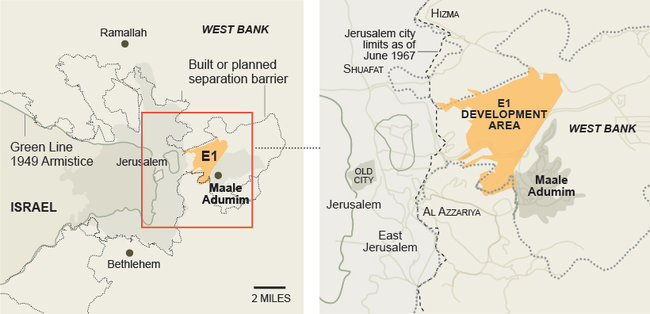November 30, 2012 For Obama, Difficult Timing of an Israeli Plan Is Nothing New
By MARK LANDLER WASHINGTON -- For President Obama, the news on Friday that Israel is planning to construct Jewish settlements in a geographically sensitive area east of Jerusalem came as a rude shock.
But maybe it should not have: Prime Minister Benjamin Netanyahu's government has announced settlement construction at inopportune moments ever since Mr. Obama took office in 2009. In March 2010, Israel approved plans for new housing during a visit by Vice President Joseph R. Biden Jr. That November, it announced 1,000 units of housing just as Mr. Obama was trying to restart talks between Israel and the Palestinians. In April 2011, it approved housing on the eve of a meeting between Mr. Obama and President Shimon Peres. This time, Israel's latest construction announcement came a day after the Palestinian Authority's victory in obtaining enhanced status from the United Nations General Assembly, a bid that the United States stood with Israel in opposing. While the pattern may be the same, Middle East experts say, the fallout may be far greater this time. "This is not just another few houses in Jerusalem or another hilltop in the West Bank," said Daniel C. Kurtzer, a former American ambassador to Israel and Egypt. "This is one of the most sensitive areas of territory, and I would hope the United States will lay down the law." Since the late 1990s, he said, the United States repeatedly has warned Israel not to build in the area abutting East Jerusalem known as E1, because settlements there would effectively bisect the West Bank and could doom plans to create a contiguous Palestinian state. While the White House and State Department criticized Israel's action, it was in diplomatic language that failed to capture the depth of the frustration that officials expressed privately. "We reiterate our longstanding opposition to settlements and East Jerusalem construction and announcements," a spokesman for the National Security Council, Tommy Vietor, said. "We believe these actions are counterproductive and make it harder to resume direct negotiations or achieve a two-state solution." The State Department spokeswoman, Victoria Nuland, suggested that the Palestinian Authority courted retaliation by going through with the United Nations vote despite repeated threats and pleas from Israel, the United States and other countries. "In the context of the move in New York," Ms. Nuland said to reporters, "you had a risk of action causing reaction. So you know, in the context of this, we're going to be evenhanded in saying we don't want to see provocative action. Instead, we want to see the parties focused on coming back to the table without preconditions." Privately, officials expressed deep frustration that Israel's action came after Israeli officials had spent days playing down the effect of the Palestinian bid and suggesting that they would only employ harsh countermeasures if the Palestinians used their enhanced status to challenge Israel in the International Criminal Court. One official said building settlements in E1 could be an "irreversible step" for the peace process. While Israel informed the United States before making the announcement, as it has before other such announcements, it clearly caught administration officials off guard. The move also comes after the United States stood with Israel against the motion by the Palestinian Authority for nonmember observer status, despite the defection of European allies like Britain, France, and Germany, which either supported or abstained from the resolution. All told, 138 countries voted for the resolution, nine voted against, and 41 countries abstained. The grab bag of countries standing with the United States and Israel included Canada, the Czech Republic, and Pacific islands that usually vote with the United States. Since violence broke out between Israel and Hamas over Gaza, Mr. Obama has worked to reaffirm the American alliance with Israel. He defended Mr. Netanyahu's right to defend Israel from rocket attacks from Gaza. And he dispatched Secretary of State Hillary Rodham Clinton to help broker a cease-fire between Hamas and Israel. The American-financed Iron Dome missile defense system fended off dozens of Hamas rockets, providing a vivid illustration of the military support the administration has given Israel. But settlements have been a recurring irritant in the relationship. Mr. Obama came into office calling on Israel to halt construction as a way to open the door to negotiations with the Palestinians. With a few temporary pauses in construction, Mr. Netanyahu has resisted. Several of Mr. Obama's fiercest clashes with the Israeli prime minister came over these announcements, not least the one made during Mr. Biden's visit, which embarrassed the vice president and enraged Mr. Obama. Some experts argued that Israel's announcement should be viewed less as an affront to Mr. Obama than as a shrewdly timed move by an Israeli leader running for re-election. "Bibi is an eye-for-an-eye kind of guy," said Aaron David Miller, vice president at the Woodrow Wilson International Center for Scholars. "Abbas pushes nonmember status at the U.N. -- in Bibi's view, a unilateral act, so Bibi responds with one of his own." At the same time, Mr. Miller said, Mr. Netanyahu's timing displayed an appreciation for Mr. Obama's own political constraints. Though freshly re-elected, the president is embroiled in a difficult negotiation with Republicans and Democrats in Congress over a fiscal agreement, as well as a possible showdown over his potential nomination of Susan E. Rice, the ambassador to the United Nations, for secretary of state. "What better time to act on settlements?" Mr. Miller said. "Obama may be an empowered second-term president, but he's still constrained on the Hill on the Israel issue; and Bibi is running for re-election."
